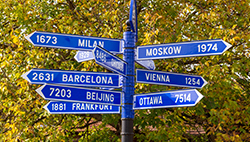Connecting UK-EU Cities & Regions
Since Brexit, many UK cities, regions and nations have explored strengthening their ties and connectivity with counterparts in Europe, despite disengagement at the central level. Cities like Birmingham, Bristol, Leeds and Cornwall have set up offices in Brussels, as have three constituent nations, Northern Ireland, Scotland and Wales. Our research on this theme involved exploring the extent of city and regional-level powers to act independently, aspects of decentralisation and federalism, the role of mayors and councils, the expansion of twinning programmes, cultural collaboration and educational exchanges. We engaged with UK and European regional government representatives, city councillors, mayors, EU committee of the Regions, Eurocities, Council of Europe, pan-European cultural organisations, British Council and politicians and activists.
In a series of dialogues, we are exploring efforts to fill gaps left by the UK’s departure from these EU funding programmes:
- NextGenerationEU aimed at speeding up the EU’s collective recovery from COVID
- Regional Development & Cohesion Funding such as European Territorial Cooperation / Interreg; Structural & Investment Funds; European Social Fund, European Solidarity Fund.
- Agricultural & Rural Development support.
- Erasmus, Creative Europe
We are also discussing how to maximise participation in 5 EU programmes the UK chose to participate in as a third country, subject to its financial contribution.
- Horizon Europe (research and innovation)
- Euratom Research and Training programme
- ITER (fusion test facility)
- Copernicus (Earth monitoring system)
- Access to EU satellite surveillance & tracking (SST) services
Our Questions
- What common challenges must UK regions and cities still face together with other Europeans?
- Which mechanisms and projects can UK actors still be part of? What new initiatives are needed?
- Can UK cities and regions create a different relationship with Europe than the UK Government’s separation approach?
- Are forging closer relations at the local level a matter of will, resources, legality and powers, or popular support?
- Will the UK Government create alternative cooperation channels to replace lost EU funds & programmes?
- What improvements can be lobbied for in the UK-EU TCA deal?
- What are future prospects for a sense of European commonality?
- How will Brexit affect UK cohesion?
Expert Conclusions
- There is broad appetite & political will to stay connected among many UK and European local officials and communities
- Cities & regions can adopt a more open strategy than central govt with creativity, resourcefulness & vision
- They must work twice as hard to do this without EU tools, programmes and arrangements
- We should generate links and information-share between UK & European cities at governance and sectoral levels
- Connectivity can also be explored from the bottom-up through grassroots groups and activism
- COVID has shown the need to empower cities and regions in implementing local plans and bringing governance closer to citizens
- Key UK-EU avenues and networks still exist to be utilised and expanded
- Expand participation in Eurocities and other similar networks to bring in other UK cities
- Explore more regional-level cooperation bilaterally and through EU Committee of the Regions, Assembly of European Regions, CPMR and other networks
- Maximise UK participation in Horizon Europe and its five mission areas
- Advocate rejoining Erasmus and/or seek replacements including bilateral initiatives such as a UK-German Youth Council
- Repurpose existing models and mechanisms in light of new realities
- Strengthen and revitalise twinning and share best practise across UK towns
- Visibly demonstrate the value of links to build public understanding & support
- Rebuild a sense of belonging – UK remains part of the European cultural space
- Engage cultural & philanthropic foundations to retain ties & people to people contacts
- Networking is important not only between city to city, but urban to rural.
- Keeping channels open may be just as important WITHIN UK, as BETWEEN UK and rest of Europe
INSIGHT HIGHLIGHTS

CITY TO CITY
In our discussions, many agreed that UK-Europe connections would endure but needed extra support. Despite Brexit, 17 UK cities remain key members of the EuroCities network of 190 cities from 39 countries – more UK cities could join.
“No separation agreement can delete centuries of historic relations between cities & people’s relations. Let’s remember that in history, states and borders might change, but cities can stay connected.”
Read more

NATIONS & REGIONS
Many networks, channels and activities have been proposed that could connect the UK and Europe at the national and regional levels and help fill the vacuum caused by Brexit.
“Though a lot of today’s problems are global, all politics is local so bottom-up approaches provide some of the most valuable solutions.”

TWINNING
A key cooperation model which is ripe for revitalisation in the post-Brexit world is the concept of twinning, also known as sister cities or strategic partnerships. Many city officials and Mayors agree that twinning is a good foundation for building a broader open strategy and creating economic opportunities in a particular area.
Read more

YOUTH & ERASMUS
Many people lament the loss of the Erasmus Plus programme for young people and advocate rejoining it. There have been widespread calls for more exchanges and interaction across ALL ages and sectors in Britain not only youth, since large parts of the British population need more understanding and engagement with the continent to which they belong.
Read more

CULTURAL LINKS
Pan European cultural organisations have a special role to play in promoting people-to-people connections.
“We need to create a sense of Europeanness and belonging to a European cultural space, where people feel part of something larger and can promote peace and welfare together.”
Read more

POLITICAL PERSPECTIVES
In discussions with politicians from all parties, we explored how to paint a new vision for UK-EU relations that builds public appreciation of Britain’s place in Europe and fosters deeper mutual understanding.
“We have a lot of national voices in politics and media who want to portray UK-EU relations as a competition or zero-sum game – we need to get alternative perspectives out there too, that show there is mutual gain to cooperation on shared challenges.”
Read more

